 I have an odd fixation with Google Zeitgeist. I’m totally fascinated by this unprecedented ability to quantitatively collect information on people’s information interests, and at the same time I’m disappointed that the insights that we gain from these snapshots are so banal and unworthy of the idea of a “zeitgeist.” In 2011, I complained about Rebecca Black’s presence at the top of the list (remember her? Took you a second, didn’t it?), and in 2010, Chatroulette (remember, that thing where strangers on the Internet showed you pictures of their junk? Took you more than a second, didn’t it?).
I have an odd fixation with Google Zeitgeist. I’m totally fascinated by this unprecedented ability to quantitatively collect information on people’s information interests, and at the same time I’m disappointed that the insights that we gain from these snapshots are so banal and unworthy of the idea of a “zeitgeist.” In 2011, I complained about Rebecca Black’s presence at the top of the list (remember her? Took you a second, didn’t it?), and in 2010, Chatroulette (remember, that thing where strangers on the Internet showed you pictures of their junk? Took you more than a second, didn’t it?).
I can’t quite make the same complaint in 2012, given that the far-from-ephemeral music legend Whitney Houston is at the top of the list. So instead of rehashing my old complaints against Google Zeitgeist, I’m going to use a different analytical approach to the data: what if we compile Google Zeitgeists over many years? Would that shed any new light on either Google Zeitgeist itself, or dare we say, the actual spirit of our times?
My first step was to compile the last 5 years of Google Zeitgeist Top 10 Trending Search Terms and assign each item to a category:
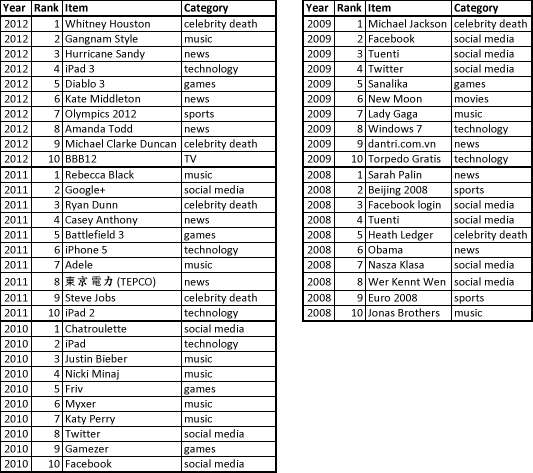
A few things to keep in mind regarding these lists:
- These are lists of top trending Google search terms, not highest volume Google search terms. Google defines “trending” as “search queries with the highest amount of traffic over a sustained period in 2012 as compared to 2011.” (Emphasis is mine.) Hence the “flash-in-a-pan” nature of the more derided results like Rebecca Black and Chatroulette.
- These lists reflect worldwide Google activity. Remember that Google’s share of the web search market is not as dominating in some parts of the world as it is in the United States; China being the most notable example.
- I used my own taxonomy based on my intuitive understanding of the different phenomena presented in the results. For example, rather than lump both Whitney Houston and Rebecca Black into the “music” category, I put Whitney Houston and Steve Jobs together in the “celebrity death” category.
- Although Google Zeitgeist goes back to 2001, I only went back 5 years, partly because it’s a nice round number, partly because there was no year-end roundup for 2006, and partly because I wanted to limit the amount that changing search habits and demographics could skew the results.
Here’s what the data looks like when you aggregate across the years, by category:
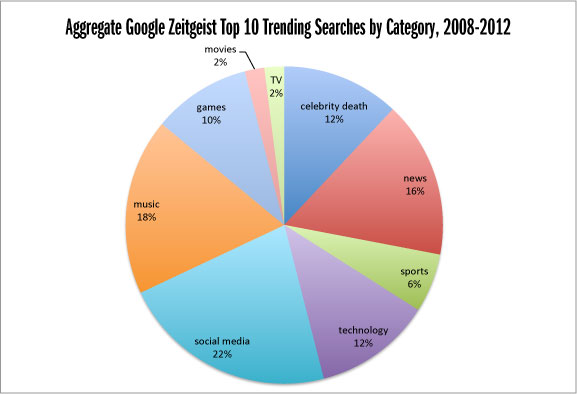
All fine and good, but what we really want to see is if there are any changes in search interests over the past five years:
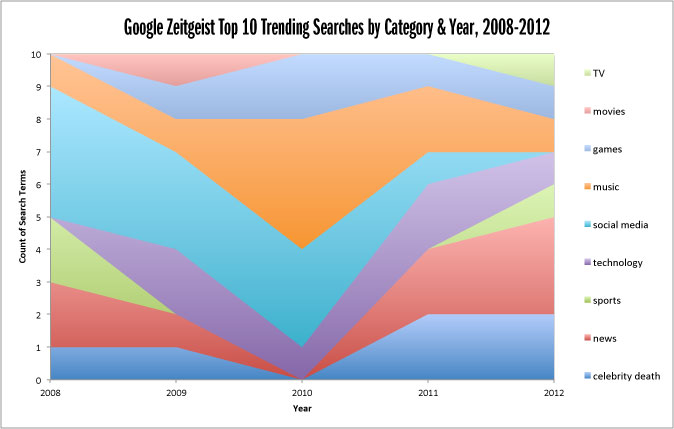
So what do we make of this? Here are a few possible takeaways:
- TV and movies are surprisingly underrepresented. The sole TV entry in the Top 10 over five years is Big Brother Brazil 12, and the sole movie entry is Twilight: New Moon.This is consistent with the idea that our media landscape is more diverse and less mass-market than it was in the pre-internet age. That being said, I’m still surprised that not even Avatar made the list, perhaps due to the year-over-year comparison calculation that powers these results.
- Searches for various social media sites has steadily declined since 2008. Is it because people are using social media less? Far from it, if Facebook and Twitter’s statistics are to believed. Instead, it’s probably due to two things: 1) the growth of social media is slowing as Facebook approaches near-total saturation and 2) the growth of social media web searches is slowing as more people access them using smart phone apps instead of a web browser.
- Sports cracked the Top 10 only twice, both in Summer Olympics years (the Euro 2008 soccer tournament also made the list). Why less love for the Winter Olympics? It may have something to do with the lack of beach volleyball (and exposed skin in general). Just a wild guess.

- Celebrity deaths are a reliable source of spikes in Google search activity, but 2010 had no such searches make the top 10 list. I perused several awful slideshows of 2010 celebrity deaths (so you don’t have to), and I can report with some confidence that no one of the iconic stature of Steve Jobs, Whitney Houston, or Michael Jackson left us in 2010. Not that iconic stature is the only requirement for making this list; Ryan Dunn of Jackass fame seems to have qualified based on the alignment of the circumstances of his death and his daredevil image.
To me, the biggest surprise in this exercise was the tailing off of social media searches. As a reminder, it’s not because the total volume is declining; it’s because the year-over-year growth in searches isn’t enough to get these terms into the top 10. Still, if my theories are right–that social media is approaching full saturation and that the usage of it is moving towards mobile devices–then we do have a finding that approaches the idea of a “zeitgeist” in the traditional sense of the term: “the defining spirit or mood of a particular period of history as shown by the ideas and beliefs of the time.” Social media–this potentially radical revolution in how humans interact with each other–not only became a “new normal” over the past five years, but is also undergoing a radical shift from the stationary computer screen to the mobile, always-on-you device. And if this radical reinvention of the radical reinvention isn’t reflective of the zeitgeist, I don’t know what is.
One last thought on the nature of Google Zeitgeist itself: I wondered if I was imbuing it with outsized importance by assuming that the Google Zeitgeist is more of a part of the popular imagination (the zeitgeist, if you will) than it actually is. To find out, I asked, well, Google:
Over the last five years, Google Zeitgeist has remained a popular year-end search term, though not with any consistent growth or shrinkage in popularity:
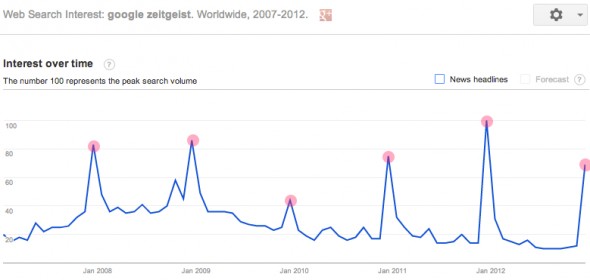
That being said, it’s still dwarfed by other popular search terms like “iPad” or “Michael Jackson.” Even “lolcats,” a niche but once-hugely popular internet meme, has towered over Google Zeitgeist over the past 5 years:
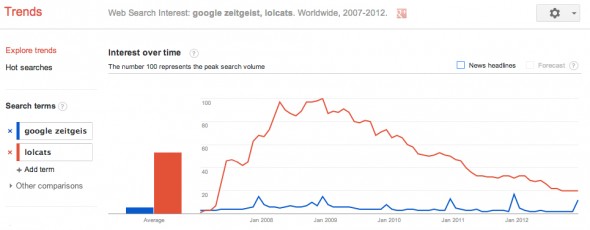
Granted, the gap has narrowed recently as searches for “lolcats” has declined while “Google Zeitgeist’ remains more or less consistent, but the point should be clear: the Google Zeitgeist itself is far from a cultural juggernaut compared to the items it contains. It’s not surprising, but it does provide some needed perspective on the matter.
Someone please correct me if this is a settled point, but what is the significance of the google search in relation of the searcher to the subject? In other words, given that a google search can be made in search of preexisting cultural products (songs, meme images) or information (wikipedia, news sites), does the use of google indicate an established interest or a self-awareness of ignorance? I’ll call these the education/appreciation functions of searches.
For example, the prominence of Whitney Houston in the 2012 results appears to be an example of post-death celebrity appreciation, researching an acknowledged figure of public interest in order to be able to perform the appropriate mourning (in this case, putting on a playlist of Whitney’s hits?). In the interest of full disclosure, I’m a middle class caucasian Brit under 20 who would have trouble naming two Whitney Houston songs off the top of my head, so the huge apparent upsurge of interest in Whitney Houston following her passing may well be the result of my own circumstances. To characterise this search trend, I might sum it up as ‘Whitney Houston was somebody I know to have been significant but about whom I feel underinformed. This puts me at risk of censure for appearing ignorant and unappreciative of her contribution to pop culture, so I should google her in order to find out about this significant person and remain able to participate in the conversation.’ This is presented as appreciation, but I would suspect that it also falls for at least part of the population on the education side of the scale.
On the other hand, Obama’s presence in the 2008 chart tells the opposite story, as he figures in the google landscape as he is becoming a public figure, but his absence from later charts shouldn’t indicate his diminished presence in the public consciousness. I would characterise this search as ‘Who is this Obama character I’m hearing so much about? He’s becoming somebody everyone wants to talk about, I ought to google him so I can remain a part of the conversation.’ This is education searching, although at the opposite end of the person’s trajectory through pop culture.
Final example; Gangnam Style. I believe this trend is strongly on the appreciation side of the spectrum, that is that people search in order to watch the music video or one of its many, many spinoffs. This function differs from education in that the search is made in order to fill a personal need for amusement or stimulation (as well as enabling participation in a popular discourse, say by making another version or mashup). I believe Rebecca Black and Lolcats also fit this category well, and better than Nikki Minaj or Justin Bieber, who have enjoyed more productive and interesting careers. These two are also searched for their cultural output, but may equally be searched for their social interest and appearances on twitter or gossip sites.
Obviously, there are no pure cases; people search for things both because they enjoy them and because they want to talk about them, often simultaneously. To bring this back to the idea of the article, I believe that the banality of these results in fact makes them more suitable indicators of the zeitgeist, and if one feels alienated from their representation of pop culture then this feeling is appropriate given the trend towards the development of niche pop cultures; why should a picture of the aggregate pop culture be recognisable? Even if this was only an average of North America, I doubt any one person could relate to every item in the top 10. The absence of the Arab Spring, Mitt Romney or healthcare reform from the charts tells us more about the way google is used than what will go down in history from the last few years.
Different note, but along the same lines.
I had a bit of the opposite reaction from Matt Lee in terms of the declining searches for social media sites. My reaction was more along the lines of “Why would someone google for that?”
I guess I can’t attest to how other people use Google, but for me, I google information that I would be unable to find otherwise. If I want to go to Facebook, I’ll simply type the url and go there directly. If I’m googling Facebook, it will probably be as part of a specific query, such as “Facebook new privacy settings” or “Facebook stock prices,” etc.
Likewise with Gangnam Style. I don’t remember Googling it at any point: if I wanted to watch the music video, I’d go directly to Youtube and search from there (although since Youtube is owned by Google, it’s possible that those results counted as part of the Zeitgeist.)
The results that didn’t surprise me were things like “Kate Middleton,” “Whitney Houston,” “ipad3” and so forth, because those seem more like the sort of query that a person would enter to search for information, as opposed to “Twitter” or “Facebook login”
What I would like to see as a comparison is a Google Anti-Zeitgeist.
This would be a list of “search queries with the lowest amount of traffic over a sustained period in 2012 as compared to 2011.”. Then we could see what has fallen off the radar completely (Hopefully Rebecca Black and Chatroulette), and what has sustained a steady search level since hitting the Zeitgeist (Like Obama).
In fact, checking out Google Trends for the #1 terms from each year:
http://www.google.com/trends/explore#q=Sarah%20Palin%2C%20Michael%20Jackson%2C%20Chatroulette%2C%20Rebecca%20Black%2C%20Whitney%20Houston&date=1%2F2007%2073m&cmpt=q
Chatroulette has maintained a solid search level. Sarah Palin may be dissapointed by the results, though.
Same-ish comment I’ve made previous years, but similar to asadok: Intent isn’t possible to measure. Rebecca Black, for example: How many of those searches were by people trying to figure out who she is? How many were because they hated the song and wanted to see who else felt the same? Or because they loved the song? Because they just wanted to make fun of it? Etc.
This is exactly what I was going for when I started writing my comment, much more succinctly put. I think the examination of search terms commonly paired with the trending topics (Justin Bieber Selena Gomez, Rebecca Black wiki) would probably tell you more in this regard. If only we had a statistical analyst with a head for pop culture somewhere on hand. Ahem.
Incidentally, I do share Mark’s sense of consternation to some degree; Are we going to be remembered for the Michael Bays and Justin Biebers of our generation? Leaving aside whether or not this is likely, I take comfort in the fact that in 20 years time, all the kids will be talking about how they wish they had lived in the 2010s.